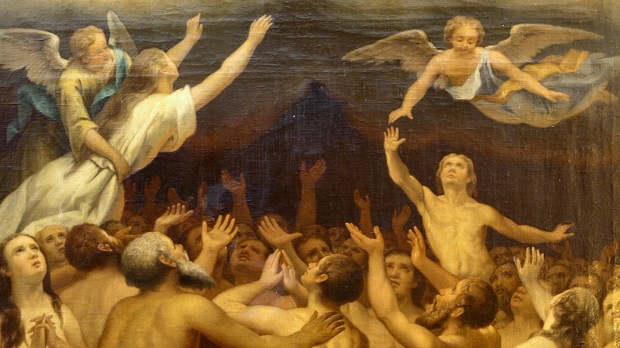One of the first decisions a young person has to make after receiving their first driver’s license (or non-driver ID) is whether or not to check that little box that would designate them as an organ donor. This selfless act could offer life-saving organ transplants to desperate patients in the event of a catastrophic emergency. There’s another selfless act of charity that Catholics can perform, however, and it can provide some after-life-saving prayers to souls in dire need.
The Heroic Act of Charity is a pledge a Catholic can make that offers all the prayers and good works of their lifetime, as well as the suffrages (prayers, good works, etc.) they may accrue after death, for the benefit of those souls bound to purgatory. It is a practice that dates back to a decree made by the Sacred Congregation of Indulgences, on 18 December, 1885, which was confirmed by Pope Leo XIII.
The Catechism of the Catholic Church (CCC) instructs that, upon death, a soul in need of purification is sent to purgatory, where it is purified over time. This purification is necessary for a soul to proceed to heaven, as Scripture teaches that nothing unclean can enter paradise. Each soul’s purgatorial stint is relative to the quantity and quality of one’s sins, and souls in purgatory are largely powerless to change their own fates.
This is why praying for the dead is among the most important Spiritual Works of Mercy. Catholics are called to help the dead atone for their sins by offering prayers for the deceased, receiving communion, or acquiring indulgences. Charity toward the souls in purgatory is a mysterious process that rests in the domain of the Communion of Saints, but the laity can support the saints through a Heroic Act of Charity.
Heroic Act of Charity
The Heroic Act of Charity, a truly selfless act, is not one to be undertaken lightly and, in fact, the Sacred Congregation of Indulgences warned that a Heroic Act of Charity should only be made after deep reflection. If a Catholic pledges a Heroic Act of Charity, they are volunteering to spend extra time in purgatory, so that other souls in purgatory may be purified faster.
By making a Heroic Act of Charity, one hands over everything that they have ever done that would be acceptable to God as atonement for one’s own sins to be used for the benefit of others. This means that the prayers, good works, faithful witness, and earthly charities you undertook in life would no longer be credited to you, but would be sacrificed to atone for the sins of others. These suffrages are placed in the hands of the Blessed Mother who distributes them among purgatorial souls at her merciful discretion.
In a sense, this is the ultimate act of charity a Catholic can make in order to emulate Christ. Just as Jesus died for the sins of us all, here we have an opportunity to sacrifice a piece of ourselves for our brothers and sisters in Christ. We could say it is similar to the last act of St. Maximilian Kolbe, who volunteered to die in place of a prisoner in the German concentration camp, Auschwitz.
It can be a frightening notion, to die with the understanding that none of the suffrages to one’s credit will stand as witness of one’s own good works, but this is where faith comes in. By undertaking a Heroic Act of Charity, one is placing oneself at the infinite mercy of God. This means that one can hold a reasonable hope that the act is in its own right a strong enough testament to a faithful life that God will not allow one’s punishments to be enacted in full.
St. Claude la Colombiere
The Heroic Act of Charity should certainly give the faithful reason to pause and contemplate prior to making the vow.
St. Claude la Colombiere is among those who hailed the commitment. When he made his own Heroic Act of Charity, St. Claude explained that a soul who has made this selfless pledge should have no fears of the torments of purgatory, because enduring such horrors for the sake of others honors God.
St. Claude wrote:
“We must not cease to expiate the past disorders of our life by penance; but it must be done without anxiety, because the worst that can befall us, when our will is good and we are submissive and obedient, is to be sent for a long time to purgatory, and we may say with good reason that this is a great evil. I do not fear purgatory.
“I know that the torments there endured are horrible, but I know that they honor God, and cannot prove an injury to the souls; that there we are certain never to oppose the will of God; that we shall never resent his severity; that we shall even love the rigors of his justice, and await with patience until it shall be entirely appeased.
“Therefore, I have given with my whole heart all my satisfactions to the souls in purgatory, and even bequeath to others all the suffrages which shall be offered for me after my death, in order that God may be glorified in paradise by souls who shall have merited to be raised to a higher degree of glory than myself.”
To learn more about the Heroic Act of Charity, read this comprehensive pamphlet: Daily Pilgrimage to Purgatory, produced by Sacred Heart Monastery.


